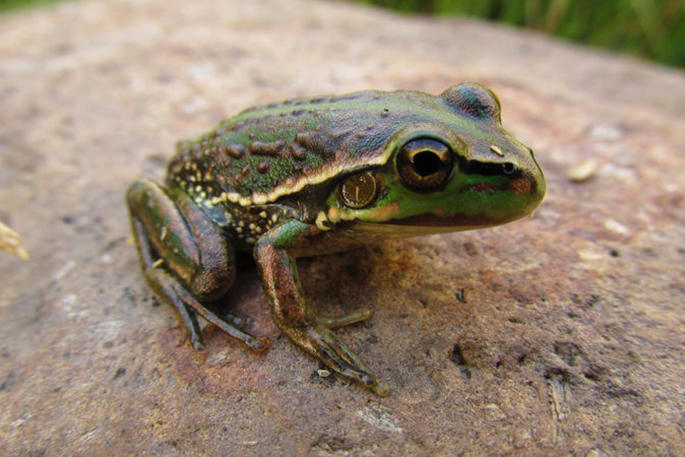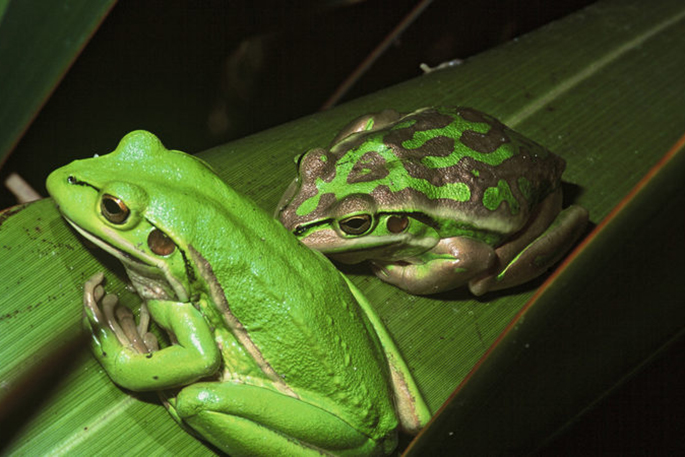A biblical plague of frogs is terrorising the residents of Papamoa.
Researcher Phil Bishop is delighted by Papamoa's frog plague, but Papamoa resident Carolyn Chatterton says she would like them to stop inviting themselves into her house.
For the second year in a row, the tiny hopping amphibians, which let off a high-pitched screech when disturbed, have invaded Papamoa.
The little green and golden bell frogs are even coming into houses at night - freaking out locals, but warming the hearts of conservation experts.
Carolyn and her husband built a home on a new section a couple of years ago.
For the past four nights, frogs had come into the house, hopping around the couple's bedroom and ensuite at night.
"One woke my husband up and he said it was on the ceiling and it actually fell onto the floor," she says.
"They make this horrendous squealing noise when they are confronted, or scared of something. That's what they are doing inside the house - they are just squealing the whole time."
The frogs are small enough to squeeze under doors, but when stretching out to jump are the size of a hand, says Carolyn.
The unwelcome visitors were not easy to evict.
"My husband gets a broom and he just tries to corner them and he just pushes them towards the door and then just pokes them out the door," she says.
"They are quite hard to spot though, because when they are scared they can make themselves very flat and get into tiny spaces."
Professor Phil Bishop from the University of Otago is a world expert on frogs and amphibian survival and conservation.
Unlike the Chattertons he was thrilled by the plague - which also hit Papamoa last year.
Bell frogs love hot, wet conditions, and breed in pools and ponds around Papamoa.
'One female frog could lay thousands of eggs, and once the tadpoles turn into frogs they had to get away from water to avoid being eaten by herons and other predators,” say Phil.
As they moved through the countryside, they came across areas of houses and the young frogs could turn up inside looking for insects, which in turn were attracted by lights at night, he says.
But once indoors the frogs could get scared - and make a high-pitched scream.

"They are probably getting stressed because inside a house is not a very good place for a frog to be because it's very dry," he says.
"They have this permeable skin where they would start to lose water. So even the act of going across a dry carpet could be enough of an irritant on their skin, and when they are losing water they get stressed.
"So they scream because they think they are being attacked by a big, furry, dry predator."
Phil couldn't think of anything nicer than sharing his bedroom with a few frogs, but says he understood Carolyn's plight.
"If she doesn't want the frogs, she should probably not use outside lights, make sure the windows and the doors are shut and put a draught excluder under the door to stop them coming in."
Papamoa's plague should only last a week or so, until all the young frogs had moved on to a more desirable habitat, he said.
He suspected there had been more frogs in Papamoa over the last couple of years because of the hot, wet weather and because there were plenty of garden ponds and pools in the area.
"There always have been frogs around that region and they must have found the perfect conditions up there and be breeding in great numbers.
"You only have to get one pair to be successful and they lay up to 3500 eggs, so you could end up with a large number of young coming through to the next generation."
The people of Papamoa should be proud of their frogs, not least because they were signs of a healthy local environment, he says.
"When you see that the frogs are doing so well, then you know that the local people are looking after their environment in a sustainable way. Frogs are very susceptible to pesticides, herbicides, any nitrates, any chemicals that you get in the water.
"We see throughout the world, that as soon as there's a small amount of pollution that can get into the frog's skin, then frog numbers start to decline."
Although green and golden bell frogs were originally introduced from Australia in the 1870s, they benefited the New Zealand ecosystem, Dr Bishop said.
"There probably were a lot of frogs here in New Zealand before humans arrived, and these frogs are filling an ecological niche that has been left vacant. They are playing a good role keeping the insects down."
Bell frogs eat live prey - mostly insects like mosquitoes or cockroaches - though they do sometimes eat other frogs. They are endangered in Australia.



8 comments
Lucky!
Posted on 17-02-2018 11:28 | By Maryfaith
We so seldom see frogs now - I would be delighted to have some at or near my place! We used to raise tadpoles until they transformed into tiny frogs, and release them in the drains at the race course. Lots of fun and great for today's kids to get their heads out of their 'electronics' and see some nature for a change.
frogs
Posted on 17-02-2018 12:09 | By dumbkof2
would love to have some of these in my pond
tisi
Posted on 17-02-2018 14:45 | By Kendra
I had some last year but none this year probably because neighbour got rid of fish pond, noise freaked my cat out. I live off 16 avenue!!
get
Posted on 17-02-2018 16:41 | By Capt_Kaveman
over it they were there before you were
The first things I thought when reading the headline....
Posted on 17-02-2018 19:06 | By GreertonBoy
is how lucky these people are to have 'this problem'. Frogs only live in a healthy environment. The tadpoles eat mosquito larvae and other insects like little champs. Then I thought why not making sure screens are on windows and put door snakes across door gaps to keep them from getting in? I went on to read the article and saw that Prop Bishop actually said all of this lol. My advice, since Carolyn is busy whining about them being in the house where they do no harm, maybe make the outside attractive to encourage the frogs to stay out there so they dont need to come in, then mark on the calendar for next year and set up and be ready for them. Meantime, get some ear plugs and enjoy the privilege of their company. They can do you no harm, coexist (and enjoy)
frogs
Posted on 18-02-2018 16:23 | By daboy
we have lived in papamoa for 2 years this year i have only seen 1 frog after all the rain last year there were at least a dozen
Get over it Carolyn
Posted on 19-02-2018 14:05 | By comfortablynumb
Its a special privilege to have wildlife around where you live. We stayed in a rainforest hotel in far North Queensland a few years back and one guest complained the rainforest wildlife sounds kept him awake at night! Some people !!
Transfer
Posted on 20-02-2018 13:02 | By overit
Phil can we transfer some of them over to Welcome Bay to release at Johnson Reserve wetlands please??
Leave a Comment
You must be logged in to make a comment.